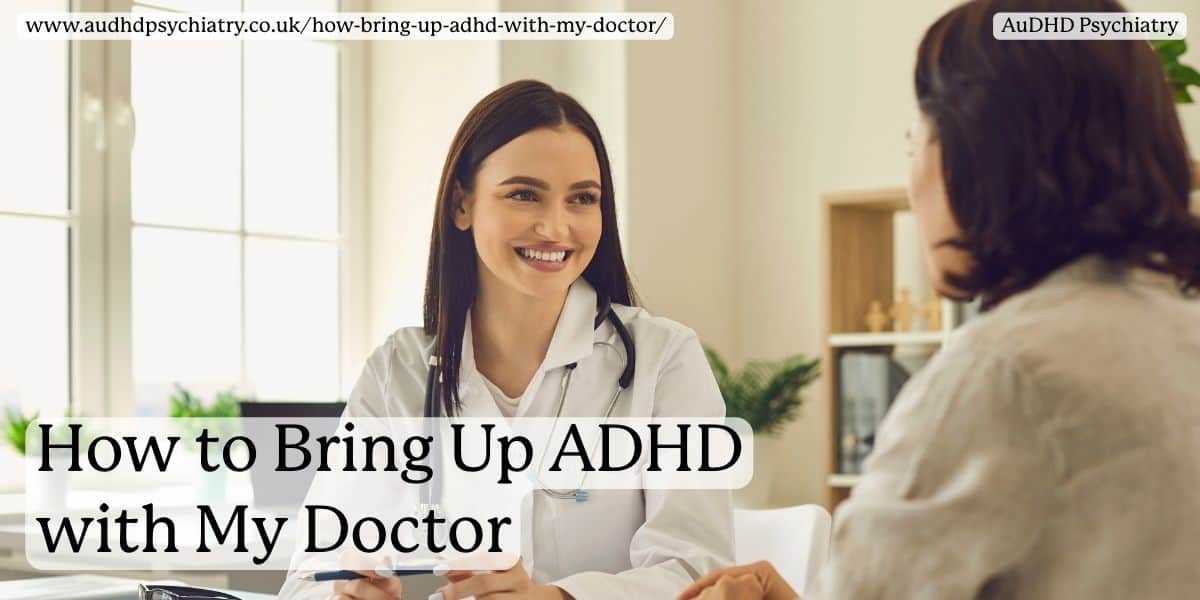
Struggling with focus, restlessness, or constant disorganisation, but unsure how to bring it up with your GP? Many feel anxious about talking to their doctor about ADHD, worrying they will not be taken seriously. The good news is that starting the conversation is the first step toward an accurate diagnosis and the right support.
The truth is that while online ADHD tests or social media posts may raise awareness, only a healthcare provider can confirm a diagnosis. Knowing how to prepare for your appointment—what to say, what not to say, and what questions to ask—can make the process far less daunting.
In this guide, we’ll explain how to describe your symptoms clearly, which specialists can help, and what to expect from an ADHD assessment.
Living with ADHD
Attention deficit hyperactivity disorder (ADHD) is a neurodevelopmental disorder that affects attention span, impulse control, and executive function. It is one of the most common conditions seen in both children and adults. Although ADHD is often associated with childhood, it continues into adulthood for many people, influencing daily activities, relationships, and work. Understanding the symptoms of ADHD is the first step toward effective treatment and management.
ADHD in Children vs Adults
Children: Signs often include hyperactive behaviour such as fidgeting, restlessness, or impulsive outbursts. Teachers and parents may notice difficulty staying seated in class, constant movement, or frequent interruptions.
Adults: Symptoms may be subtler. Instead of physical hyperactivity, many adults experience inner restlessness, procrastination, or chronic disorganisation. Adults with ADHD often experience struggles with time management, missed deadlines, and forgetfulness.
Signs and Symptoms of ADHD
The presentation of ADHD usually falls into three categories:
- Inattentive type: Losing items, poor concentration, careless mistakes, and difficulty sustaining focus on tasks.
- Hyperactive-impulsive type: Talking excessively, feeling “on the go,” difficulty relaxing, and impulsive behaviours like interrupting conversations or rushing decisions.
- Combined type: A mixture of both inattentive and hyperactive symptoms.
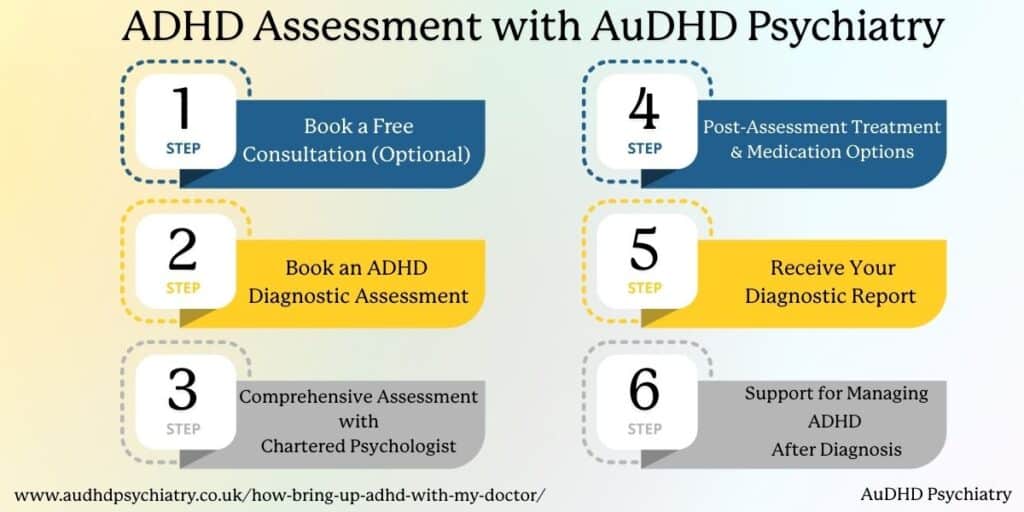
AuDHD Psychiatry’s Step-by-Step ADHD Assessment Process
The diagnosis of ADHD is a structured process carried out by a healthcare provider:
- Screening tools: Questionnaires such as the ASRS-v1.1 or child-specific rating scales.
- Clinical interviews: A diagnostic interview that explores developmental history, family history, and daily functioning. This forms an important step within the Adult ADHD diagnosis process.
- Behavioural assessments: Use of behavioural rating scales completed by parents, teachers, or significant others to provide a broader picture.
- Comprehensive evaluation: Some clinicians may also include a medical history review or physical exam to rule out other medical conditions like sleep disorders or thyroid issues.
Here’s what an ADHD Assessment with us looks like:
Step 1: Book a Free Consultation (Optional)
If you’re unsure where to start, you can arrange an initial conversation with one of our clinicians. This is a chance to ask questions, share your concerns, and decide whether a full Adult ADHD Assessment feels right for you.
Step 2: Book an ADHD Diagnostic Assessment
When you’re ready, the next step is to book a structured ADHD assessment. This ensures your evaluation follows recognised clinical standards and offers clarity about your symptoms.
Step 3: Comprehensive Assessment with a Chartered Psychologist
A detailed evaluation is carried out by a qualified professional. This includes a clinical interview, symptom review, and consideration of your developmental history to rule out other possible explanations.
Step 4: Post-Assessment Treatment & Medication Options
If ADHD is diagnosed, your clinician will discuss appropriate treatment pathways. This may include medication, therapy, or lifestyle recommendations tailored to your needs.
Step 5: Receive Your Diagnostic Report
You’ll be provided with a formal diagnostic report. This can be used for workplace or educational adjustments and forms the foundation for your ongoing care.
Step 6: Support for Managing ADHD After Diagnosis
Diagnosis is just the beginning. Ongoing support is available to help you manage ADHD effectively, whether through coaching, therapy, or follow-up medical care, ensuring a seamless ADHD care transfer between different specialists or services.
Can ADHD Get Worse With Age?
ADHD does not necessarily worsen with age, but untreated ADHD can create greater challenges over time. Moving from assessment to medication can make a significant difference in managing symptoms and improving daily life. For example:
- Adults may develop low self-esteem after years of struggling with organisation and productivity.
- Stress, burnout, or co-occurring mental health conditions may intensify symptoms.
- Environmental factors often make difficulties more noticeable.
Recognising ADHD early and pursuing a comprehensive evaluation ensures symptoms are addressed, improving quality of life at any stage.
What Doctors and Specialists Help Diagnose ADHD?
Your primary care doctor (GP) is often the first step in the ADHD assessment pathway. While not all GPs can give a formal diagnosis of ADHD, they can listen to your concerns, review your medical history, and provide a referral to an ADHD specialist. You can also get a private ADHD assessment without a GP referral. In some cases, ADHD symptoms overlap with autism spectrum traits. If this is a concern, your clinician may also suggest an adult autism assessment for a fuller understanding.
Who Can Diagnose Whether I Have ADHD?
- GPs (General Practitioners): Can initiate referrals but rarely provide a final diagnosis.
- Psychiatrists: Specialists in neurodevelopmental disorders who carry out structured diagnostic interviews and prescribe ADHD medication.
- Clinical psychologists: Can perform comprehensive evaluations but cannot prescribe medication.
- ADHD specialists: Some private clinics, such as AuDHD Psychiatry, employ psychiatrists and psychologists with specific expertise in adult ADHD. If you’re considering a more in-depth evaluation, neurodivergent assessments by specialists in neurodevelopmental disorders are recommended for a clearer understanding of your symptoms and treatment options.
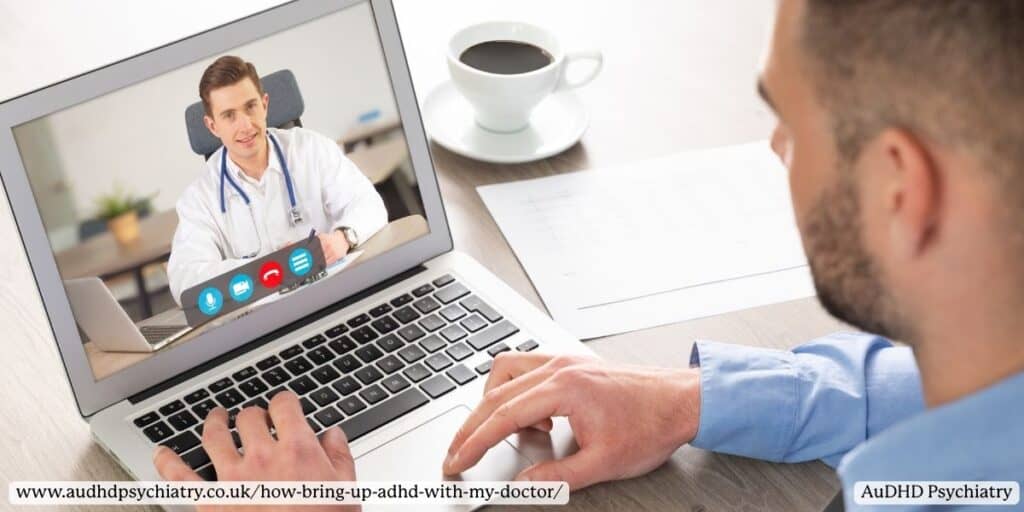
The Role of Your Doctor in ADHD Diagnosis
Your doctor’s role is to:
- Review your symptoms of ADHD and rule out similar conditions.
- Assess your family history and childhood behaviours.
- Provide referrals for a full ADHD evaluation with the right specialist.
- Support you in accessing treatment and ADHD support, such as reasonable adjustments in the workplace or therapy for ADHD.
What Doctors Need to Know Before a Diagnosis
Your healthcare provider will want details about your daily life and how symptoms interfere with work, relationships, or education. They may also inquire about any previous mental health conditions or treatments you have tried. Input from family members or partners who can confirm childhood or current behaviours could also be helpful. If you have examples of attention problems, impulsive behaviour, or disorganisation, you may want to list these so you can share them with your doctor.
How Doctors Test for ADHD
Doctors use a combination of methods:
- Behavioural rating scales
- Diagnostic interview aligned with DSM-5 or ICD-11 criteria
- Review of medical history and potential co-existing conditions
- Sometimes a physical exam to exclude other causes
Ultimately, only a qualified healthcare professional can provide an accurate ADHD diagnosis. Online quizzes or self-assessment tools may act as a starting point but should never replace professional evaluation.
Preparing for Your Doctor’s Appointment
Many people feel anxious about talking to a doctor about ADHD. Being prepared can make the conversation clearer and more productive.
Gather Your Thoughts and Concerns
Before the appointment, write down your main worries about living with ADHD. Note whether these affect your work, studies, or relationships.
Document Your Symptoms
- Keep a symptom diary for at least two weeks.
- Include real-life examples such as missed deadlines, poor time management, or difficulties following conversations.
- If you are a parent, include notes on your child’s behaviours at home and school.
Make a List of Questions
Prepare questions such as:
- “How do I get tested for ADHD?”
- “What treatment options, including therapy for ADHD, are available?”
- “What lifestyle modifications might help me manage symptoms?”
ADHD Support from Family and Friends
Bringing a close friend or family member can provide extra perspective. They may recall behaviours you overlook and can support you if you feel nervous.
Reminders for Talking to Your Doctor About ADHD
- Don’t worry about labels. Your doctor’s role is to help, not to judge.
- Book a specific appointment. This ensures enough time to discuss your concerns.
- Explain with real-life examples. Describe how ADHD symptoms affect your daily activities.
- Be honest. If you have ever tried someone else’s ADHD medication, mention it. This helps your doctor ensure safe and proper treatment.
What Not to Say to Your Doctor About ADHD
Avoid vague statements such as “I think I just procrastinate too much.” Instead, be specific about patterns of attention problems, impulsivity, or disorganisation. Also, avoid self-diagnosing without evidence; instead, describe your daily life challenges and let the professional lead the assessment. By preparing thoroughly, you improve the chance of a productive appointment and take the first step toward an accurate diagnosis and effective personal treatment plan.
Communicating Effectively with Your Doctor

Describing Your Symptoms Accurately
When talking to your doctor about ADHD, the way you explain your symptoms can make a significant difference to the outcome of your appointment. Many patients feel nervous about being dismissed or misunderstood, but a structured and honest approach helps ensure your concerns are taken seriously. The first step is learning how to describe your difficulties clearly.
Instead of vague phrases such as “I procrastinate too much,” it is more effective to give detailed examples, such as:
- “I miss deadlines at work even when I start on time.”
- “I lose track of conversations in meetings.”
- “At home, I frequently misplace important items.”
A symptom diary is an excellent way to capture these patterns. Documenting your experiences across daily activities helps your healthcare provider see how ADHD symptoms affect your quality of life.
Discussing Concerns Openly
Many people hesitate to raise ADHD due to stigma or self-doubt. You may worry your doctor won’t take you seriously or that your struggles will be dismissed as stress. It helps to acknowledge these concerns directly by sharing how long the difficulties have persisted. Explain the impact on work, school, or relationships, and be honest about fears of being labelled or misunderstood.
By presenting a full picture of how these problems persist across different settings, you demonstrate that your concerns are not temporary stress but part of a consistent pattern. This allows your healthcare provider to consider ADHD alongside other possible explanations, such as mood or anxiety disorders.
Asking the Right Questions
Asking questions during the appointment also helps you engage with the process rather than waiting passively for answers. For example, you might ask:
- “What is ADHD, and how does it present differently in adults and children?”
- “What are the next steps in the ADHD evaluation process?”
- “What non-medication supports—like therapy for ADHD, ADHD coaching, or support groups—are available alongside medication?”
These questions not only give you practical guidance but also show your doctor that you are prepared to work collaboratively on your care.
Ultimately, effective communication is about accuracy, openness, and engagement. By describing your symptoms with specific examples, being honest about your concerns, and asking informed questions, you create a stronger partnership with your healthcare provider. This increases the likelihood of a proper diagnosis of ADHD and ensures that your eventual treatment plan is personalised, credible, and effective.
Questions to Ask Your Doctor About ADHD
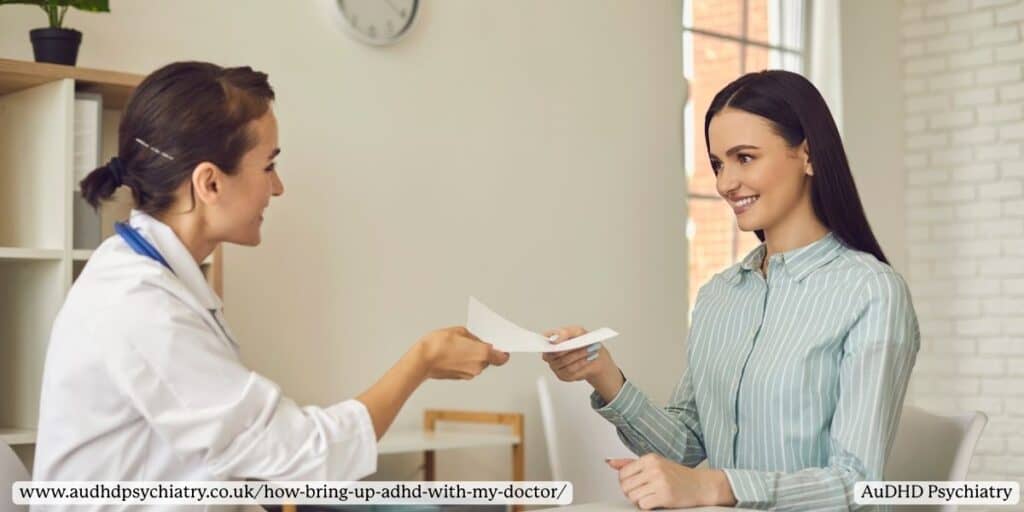
Exploring Treatment Options
One of the most common worries is whether doctors only prescribe stimulants such as Adderall. In the UK, doctors can prescribe stimulant medications (like methylphenidate or lisdexamfetamine) or non-stimulant medications (such as atomoxetine or guanfacine). Asking, “What different treatment options are available for ADHD?” ensures you understand all possible pathways.
Tracking Progress
It’s important to ask: “How can I best keep track of my progress?” Doctors often recommend a symptom diary, input from family members, or structured rating scales. These tools make it easier to measure whether your ADHD management plan is effective.
Non-Medication Supports
Non-medication support should also be explored. Medication can be highly effective, but it is rarely sufficient on its own. Ask your doctor about:
- Therapy for ADHD (cognitive behavioural therapy, counselling)
- ADHD coaching (organisational skills, time management, accountability)
- Lifestyle modifications (healthy diet, exercise, mindfulness meditation)
- Support groups for ongoing encouragement
Support from AuDHD Psychiatry
If you prefer quick access, you can choose a private ADHD assessment. At AuDHD Psychiatry, we provide comprehensive evaluations and personalised treatment plans, ensuring both medication and non-medication supports are considered. Simply book a time that works for you, and we’ll guide you through the process.
Understanding Your Doctor’s Perspective
Your Doctor’s Responsibilities
When you are talking to your doctor about ADHD, it helps to understand how they approach the assessment process. Doctors are not there to dismiss your concerns; their role is to ensure you receive an accurate diagnosis and a safe, effective treatment plan. Knowing their perspective can make consultations less intimidating and help you work together more effectively.
Why Doctors Take a Structured Approach
ADHD symptoms can co-occur with other mental health disorders, which may include anxiety, depression, or sleep disorders. Because of this, doctors must follow a structured pathway before making a diagnosis. This may involve:
- Reviewing your medical history and family history.
- Assessing whether symptoms have been present since childhood.
- Asking how difficulties appear across different settings, such as home, school, or work.
- Using behavioural rating scales or structured interviews aligned with DSM-5 or ICD-11 ADHD diagnostic criteria.
This thorough process is not about doubting your experiences but about ruling out other explanations and ensuring that the diagnosis is reliable.
Your Safety Is Paramount
Another part of the doctor’s perspective is safety. Prescribing stimulant medicines without a thorough evaluation would be unsafe because of potential side effects and the risk of misuse. Your healthcare provider must ensure that ADHD is the correct diagnosis before suggesting a treatment plan that may include medication. They also need to ensure that your treatment plan is appropriate and that no other untreated medical condition is contributing to your symptoms.
If your doctor suggests therapy or lifestyle changes before medication, this should not be interpreted as dismissal but rather as part of a holistic approach to ADHD treatment. Many clinicians prefer to begin with non-medication supports, especially when symptoms are mild or when other mental health issues are also present.
System Pressures and Options
Doctors are also influenced by system pressures. In the NHS, long waiting times for referrals are common, and your GP may have to balance your request with limited resources. This can be frustrating for patients, but knowing that the delay is not personal helps maintain trust in the process.
For those who want faster access, private clinics such as AuDHD Psychiatry offer structured assessments carried out by qualified specialists, ensuring accuracy and timely support.
What Doctors Value from Patients
Finally, remember that doctors value clear communication from patients. When you present organised notes, ask informed questions, and share relevant examples, it makes their job easier and improves the accuracy of the diagnosis. By understanding your doctor’s perspective, you approach the consultation not only as a patient seeking help but as an active partner in the process of getting an accurate ADHD diagnosis.
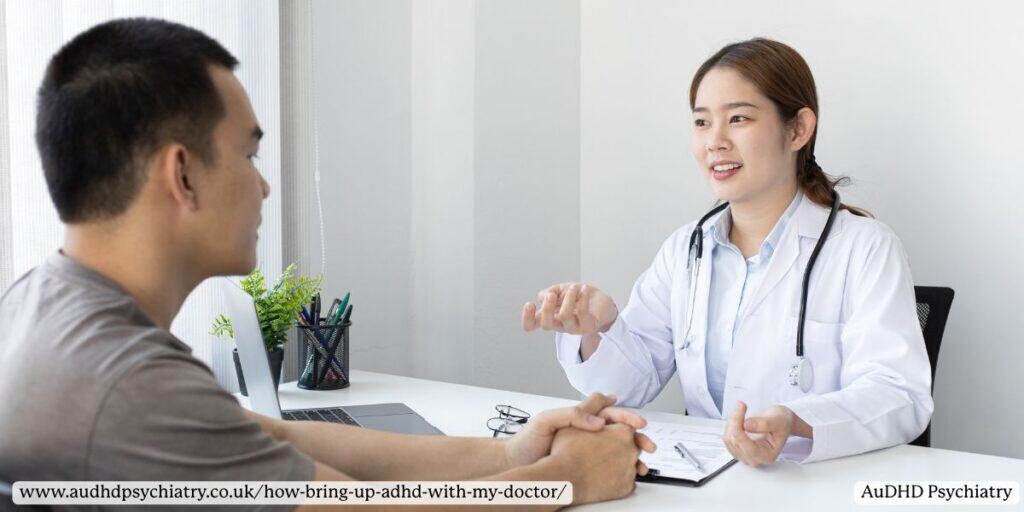
Additional Considerations
Talking to your doctor about ADHD is not always straightforward. Beyond the assessment process, there are wider issues that shape how patients experience healthcare, from stigma to the rise of ADHD misconceptions on social media. Understanding these factors about undiagnosed ADHD helps you prepare and approach your appointment with confidence.
ADHD Stigma in Healthcare
Some patients worry they will not be taken seriously if they say, “I think I have ADHD.” Stigma remains a barrier, particularly for adults who may feel their symptoms are seen as laziness or poor time management. This can delay mental health treatment and prevent individuals from accessing appropriate care.
Recognising ADHD as a neurodevelopmental disorder rather than a character flaw is essential to breaking down this stigma.
The Risks of Misinformation
Social media platforms have increased awareness of ADHD but also created confusion. Short videos and posts often oversimplify symptoms, presenting ADHD as quirky habits rather than a serious condition. While online communities can provide ADHD support, they should never replace a structured evaluation by a qualified healthcare professional. Professional input ensures an accurate diagnosis and avoids the risks of self-diagnosis.
Telehealth and Online Diagnosis
Telehealth has made ADHD assessments more accessible across the UK. Online consultations with psychiatrists and psychologists can be safe and effective when carried out by regulated providers. However, patients should be cautious of services that promise instant diagnoses without thorough behavioural assessments or medical history reviews.
At AuDHD Psychiatry, every online ADHD assessment is conducted by a Chartered Psychiatrist using recognised diagnostic criteria such as DSM-5 and ICD-11. Our process follows NICE guidelines and includes structured clinical interviews, validated rating scales, and thorough screening for co-occurring conditions. We ensure that if you get diagnosed with ADHD, you receive personalised treatment plans you can trust.
Whether that’s through medication, therapy, ADHD support groups, coaching, or a combination of these, we’ll be with you every step of the way.
What Not to Say to Someone With ADHD
Whether you are speaking to a friend, family member, or your doctor, avoid dismissive comments such as:
- “Everyone gets distracted sometimes.”
- “You just need to try harder.”
- “ADHD isn’t real.”
- “It’s only for children.”
Such statements minimise real struggles and increase stigma. Instead, approach conversations with openness and empathy.
Talking to Your Doctor About ADHD: Conclusion
Speaking to your doctor about ADHD can feel daunting, but preparation and openness make the process more effective. From recognising the symptoms of ADHD in both children and adults to understanding the role of different healthcare providers, the journey toward diagnosis is structured to ensure accuracy and safety.While self-diagnosis or online quizzes may raise awareness, only a professional ADHD diagnosis provides clarity, access to treatment, and credibility for support at school, work, or home.
If you are living with ADHD symptoms that affect your daily life, the most important step you can take is to seek a thorough evaluation with a qualified specialist. Take the first step today. Book your ADHD assessment with AuDHD Psychiatry and move forward with confidence and support.
You Might Also Like
Contact Us
We’re here to answer any questions you might have.
Get in Touch
Opening Hours
Contact Form
We’re here to help. Reach out and we’ll get back to you within 24 hours (Monday – Friday).

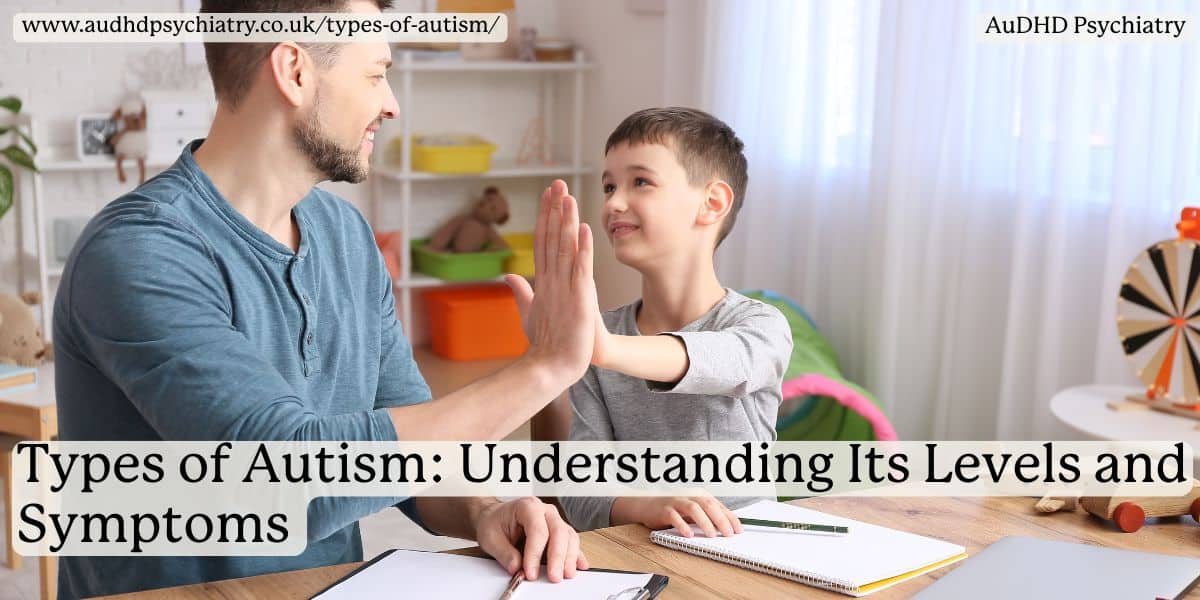
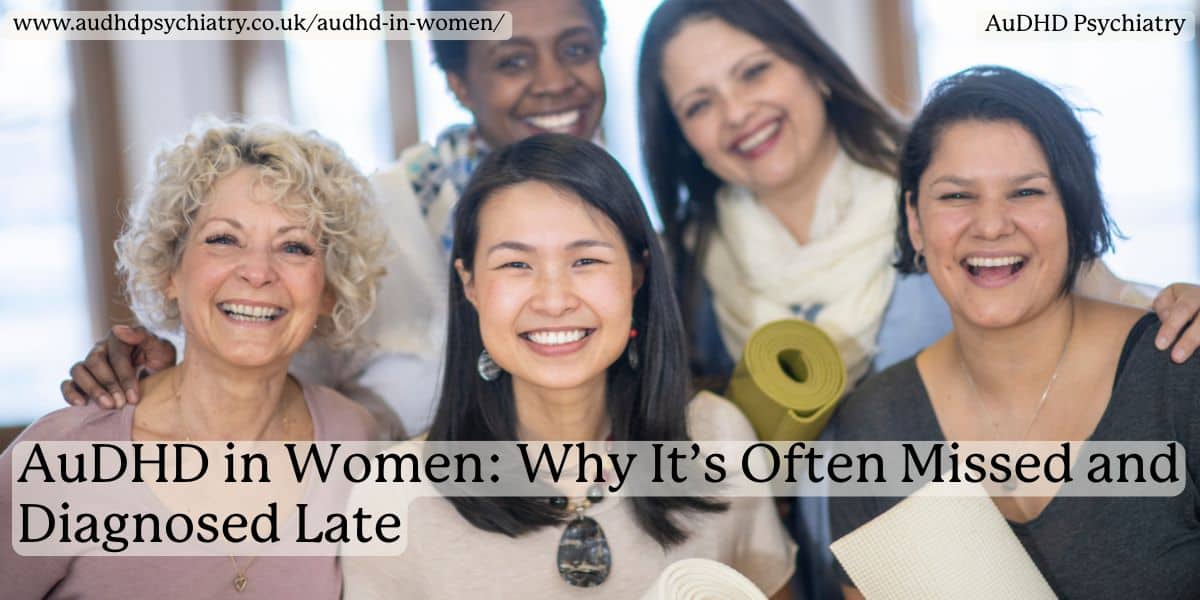
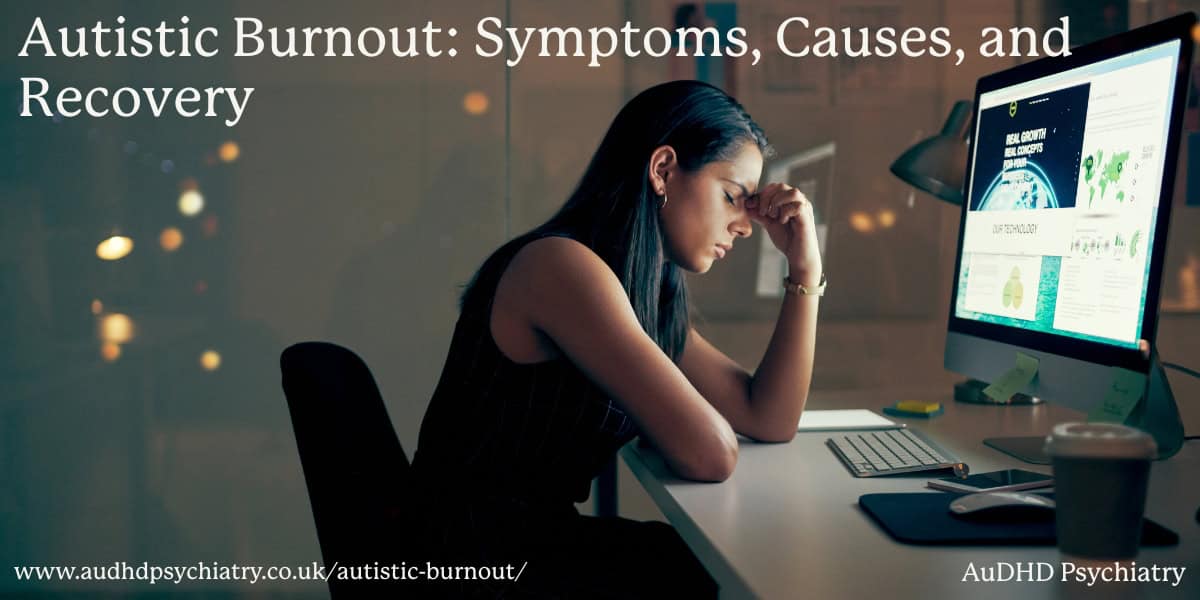
Leave a Reply